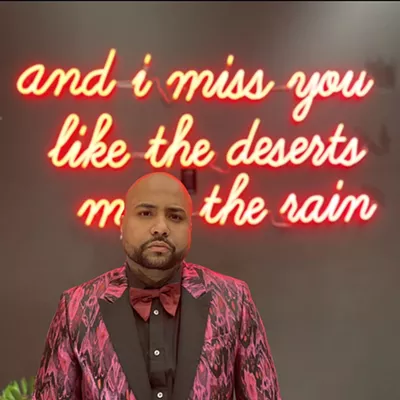Anyway, there I was, listening to the radio and attempting the equal of dancing about architecture (which someone once called writing about music), when allasudden, there's Camper Van Beethoven's "One of These Days" blasting out of the speakers--a not-so-bizarre occurrence, maybe, when you've got a station like KXCI in your town, but glory be, there it was! A sneering challenge to an unnamed someone to explain the meaning of life that somehow leaves you energized in its wake, the song is just one of a bushel that somehow made the intersection of (what was then referred to as) college rock and world music influences cool.
Sure, these days, with bands like DeVotchKa, Gogol Bordello and dozens of others that incorporate world music into their sonic stew, the melding of disparate types of music has become somewhat commonplace. But, in the 1980s, when most of the stuff played on college radio fell mostly into two camps--punk and synth-pop--Camper Van Beethoven's mix of rock, ska, punk, folk and anything that sounded remotely ethnic (with then-uncool violin as a primary instrument, no less), teamed with often absurd, witty lyrics, was nothing short of revelatory.
After five stellar albums and a pair of EPs, Camper collapsed as the '80s came to a close. Singer/guitarist David Lowery teamed up with his friend, guitarist Johnny Hickman, to form Cracker, which followed a more traditional rootsy-rock path (in a 2001 interview with The Weekly, Lowery said, "I always said that Camper wanted to be The Beatles, and Cracker wanted to be The Rolling Stones, but really, in sum total, we ended up being The Kinks"). The band found mainstream success with a trio of successful singles, "Teen Angst (What the World Needs Now)," "Get Off This," and "Low." But sales of the band's later albums failed to meet expectations, so at the turn of the century, Cracker was given its walking papers from Virgin, Lowery's label dating back to the last two Camper Van Beethoven albums. Surprisingly, if anything, it seems to have rejuvenated the band. Last year Cracker released two unorthodox albums that likely wouldn't have seen the light of day on Virgin: O Cracker, Where Art Thou? (Pitch A Tent), a collaboration with jamgrassers Leftover Salmon that recast old Cracker tunes as bluegrass songs, and Countrysides (IM), a collection of covers of old country songs, with "Ain't Gonna Suck Itself," a Lowery-penned kiss-off to Virgin tacked on at the end.
But, a few years ago, a funny thing happened. The members of Camper came together to compile odds and ends for a subsequent album and ended up recording some new material. The release of Camper Van Beethoven Is Dead: Long Live Camper Van Beethoven (Pitch a Tent), in 2000, began a spate of activity in the Camper ranks. Since then, the band has released Cigarettes & Carrot Juice: The Santa Cruz Years (SpinArt), a career-spanning box set, and its song-by-song reinterpretation of Fleetwood Mac's bloated, cocaine cautionary tale, Tusk (Pitch a Tent); Michael Moore used the band's "Take the Skinheads Bowling" as the theme song to Bowling for Columbine; and, in what seems like a gift to a generation that missed their powerful live shows the first time around, the band began touring again. (Camper's set at the 2003 South By Southwest music conference, in Austin, demonstrated that the group hasn't lost a step, and was one of the week's highlights.)
This week, the two bands team up for a co-headlining tour of the West that will see each band performing hour-and-a-half sets, with the order of appearance determined by coin-toss. It may be just another outing for Cracker fans, but for us old-school Camper Van Beethoven worshipers, it'll be a day we thought we'd never see.








